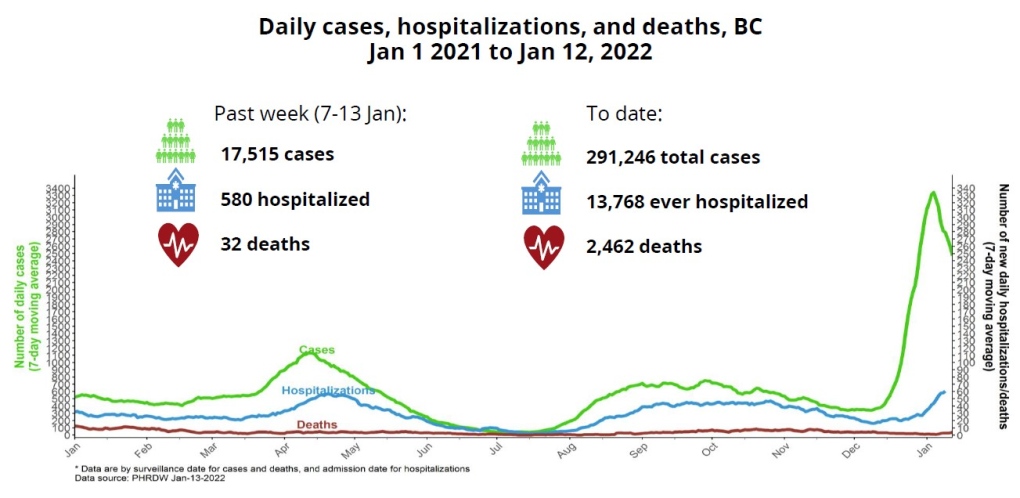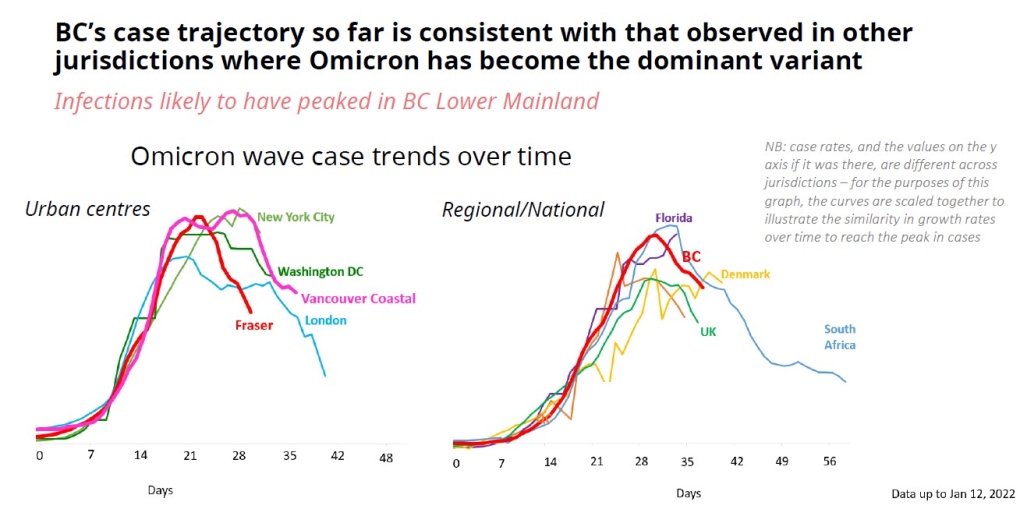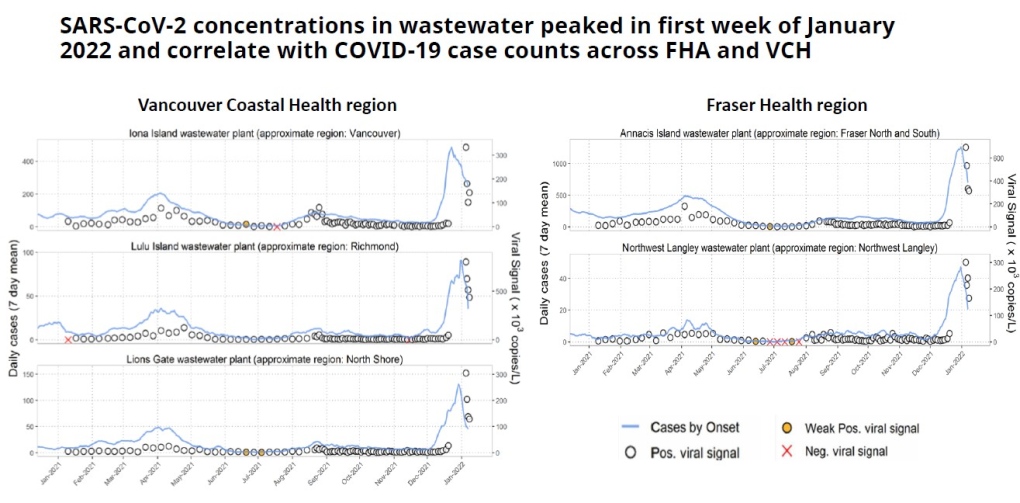B.C. likely hit COVID-19 transmission peak last weekend, officials say, revealing latest data
The latest COVID-19 wave may be on a downward trajectory in B.C., health officials announced Friday.
Dr. Bonnie Henry and Health Minister Adrian Dix shared the latest modelling data in a morning news conference, revealing they believe the local peak of infections was likely hit last weekend. Daily cases reached record-breaking levels recently, largely due to how transmissible the Omicron variant is.
COVID-19 case data in the latest wave hasn't painted a full picture of how many people are infected with the disease as B.C. has struggled with its testing capacity. The more reliable PCR tests are being reserved for people who are more at risk for developing serious illness, unvaccinated or doing front-line work. Rapid tests, however, are still difficult for most people to access.
As a result, officials said Friday that PCR testing – and therefore reported case counts – just represents a subset of the community, but that it's a high-risk subset with high test-positivity rates. Officials said those positive PCR results are declining, adding that the specific case numbers aren't as important as the overall trajectory.
Officials suggested that transmission is still likely three to four times the numbers reported daily.
"We've been at the capacity of our PCR tests for a number of weeks now," Henry said.
"But it does give us a sense because we've been monitoring PCR testing over time, it does reflect the change and the patterns over time." Modelling data released by B.C. health officials on Jan. 14, 2022.
Modelling data released by B.C. health officials on Jan. 14, 2022.
Additional data shared by health officials showed the Lower Mainland's case trajectory is similar to other urban centres where Omicron has become dominant, with the latest wave lasting just a few weeks before starting that downward trend.
"We can now say with some confidence that the pattern shows a sustained decrease and that pattern reflects what we're seeing in other jurisdictions," Henry said.
That B.C. may have reached its peak in this wave so quickly isn't a huge surprise, officials said, explaining the Omicron variant has shown to have both a shorter incubation period and a shorter illness duration.
 Modelling data released by B.C. health officials on Jan. 14, 2022. Another way health officials have tracked the trend in local cases is through wastewater testing. Screening of wastewater at five Metro Vancouver plants shows detection of the virus is trending downward.
Modelling data released by B.C. health officials on Jan. 14, 2022. Another way health officials have tracked the trend in local cases is through wastewater testing. Screening of wastewater at five Metro Vancouver plants shows detection of the virus is trending downward.
Throughout the pandemic, wastewater has been used as an early warning signal for COVID-19 in a community and fill the gaps when testing is over capacity.
"When we look at wastewater surveillance, it's not dependent on who gets tested," Henry explained. "It really is a barometer of how much virus is in a community."
Henry said that surveillance suggests a peak in the virus at around the first week of January, which she said "is very similar" to PCR testing data.
 Modelling data released by B.C. health officials on Jan. 14, 2022. But even with cases declining, the same can't be said for hospitalizations.
Modelling data released by B.C. health officials on Jan. 14, 2022. But even with cases declining, the same can't be said for hospitalizations.
"We are still at the point where our hospitalization rate is going up," Henry said. "New hospitalizations (are) still a concern."
Officials explained those rates tend to be delayed compared to infections and that it could be about a week or two before there's a decrease in those numbers.
CTVNews.ca Top Stories

Former soldier 'Canadian Dave' taken by the Taliban: sources
David Lavery, a former Canadian Forces soldier who helped approximately 100 people flee Afghanistan during the fall of Kabul, has been 'picked up' by the Taliban this week, according to multiple sources who spoke to CTV National News on the condition of anonymity.
Canada Revenue Agency eliminating nearly 600 term positions by end of 2024
The Canada Revenue Agency will be eliminating approximately 600 temporary and contract employees across the country by mid-December.
Montreal road rage caught on video: Suspect charged with assault causing bodily harm
A 47-year-old Terrebonne man has been charged following a case of road rage in broad daylight last summer on the Ile-aux-Tourtes bridge.
Alta. Premier Danielle Smith will be in Washington for Trump inauguration
Alberta Premier Danielle Smith will be heading to Washington, D.C., for Donald Trump's presidential inauguration.
WestJet passengers can submit claims now in $12.5M class-action case over baggage fees
Some travellers who checked baggage on certain WestJet flights between 2014 and 2019 may now claim their share of a class-action settlement approved by the British Columbia Supreme Court last month and valued at $12.5 million.
Trump names Karoline Leavitt as youngest ever White House press secretary
U.S. President-elect Donald Trump on Friday named Karoline Leavitt, his campaign press secretary, to serve as his White House press secretary.
Mike Tyson vs. Jake Paul: How to watch the fight, what time and who's the favourite?
YouTuber-turned-boxer Jake Paul had to wait an extra four months for his high-profile match with 58-year-old former heavyweight champion Mike Tyson, but fight night has arrived.
Iranian official met with Musk in a possible step to ease tensions with Trump
Iran successfully sought a meeting with Elon Musk, according to a U.S. official, one in a series of steps that appeared aimed at easing tensions with President-elect Donald Trump.
































